You are here
-
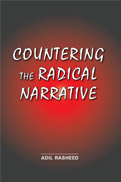
- Publisher: KW Publishers
2020
Terrorist groups are driven by extremist political ideologies or distorted religious discourses, which they then propagate through traditional and modern means of communication to wean more recruits to their diabolic designs.The indoctrination of these extremist ideologies lead to transformation of law-abiding citizens into violent extremists, a process known as radicalisation. This book proposes ways and techniques for reversing this process of radicalisation by taking the fight to the terrorists in the ideological domain. It proposes ways for developing and launching counter-narrative campaigns against radicalisation in order to drain the ideological swamp from which terrorist organisations continue to rear their ugly heads. This book specifically provides conceptual insights into developing counter-narratives against jihadist organisations, like Al Qaeda, ISIS and Pakistan-based terror groups.
- ISBN: 978-938-913-771-2 ,
- Price: ₹.1088/-
- Publisher: KW Publishers
-
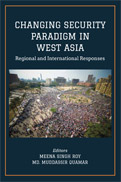
- Publisher: KW Publishers
2020
The states of West Asia continue to grapple with dramatic changes taking place in the domestic and regional environment. Security has emerged as a significant concern for them. The political upheavals, civil strife, sectarian violence, and terrorism in the area have implications for the regional and global order. As the region grapples with myriad socio-economic problems, many extra-regional players and non-state actors, and a few regional ones, are attempting to carve out their own areas of influence. These developments across West Asia demand constant monitoring and careful analyses. This book is a collection of essays exploring various aspects of the changing security paradigm in West Asia and the regional and international responses.- ISBN: 978-93-89137-59-0 ,
- Price: ₹.1280/-
- Publisher: KW Publishers
-
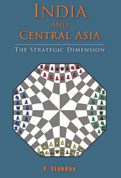
- Publisher: KW Publishers
2020
Central Asia is the northern frontier of the Islamic world hitherto unaffected by fundamentalist wave. The Soviet developmental legacy still remains as a bulwark against potential extremist threats emanating from Pakistan and Afghanistan. However, behind the secular settings a major shift to a far more religious pattern of society is underway in the region.Over the years, India has been taking renewed interest in enhancing its strategic presence in Central Asia, but it is yet to capitalise on various opportunities and potentials. India's full membership into the SCO now opens up an opportunity for a closer engagement with region but New Delhi still lacks a political-strategic clarity.
This book is an attempt to provide an overview of the political and strategic process at work in Central Asia since its emergence in 1991 and the intricate issues that impinge on India. The book is mostly about identifying critical points that are important for evolving a sound Central Asia policy in India.
The book does not in any sense purport to be an academic endeavour on Central Asian studies but merely a narrative, as well as, an analytical account and a result of author's own self-education and understanding gathered through extensive interactions with wide sections of people in Kyrgyzstan and Kazakhstan, especially with the think tanks, academia, government officials and the diplomatic community. The chapters in book are capsulated to provide analyses of the impinging issues that shape the dynamic interplay between Central Asia's internal polity and its external outlook. The book contains aspects critical for enhancing India's strategic presence in the region.
- ISBN: 9789389137460 ,
- Price: ₹.1428/-
- Publisher: KW Publishers
-
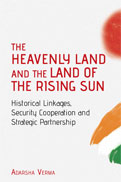
- Publisher: KW Publishers
2020
Security relations between India and Japan hold great potential to shape the future security architecture of the Indo-Pacific region. This book delves into this aspect holistically tracing the linkages between the two countries with advent of Buddhism into Japan from India, through China and Korea. Geography and strategic factors shaping the security of Japan have been evaluated and issues of defence cooperation, maritime security, cooperation in UN Peace Keeping Operations and strategic partnership between Indian and Japan have been deliberated. Set in both, a bilateral as well as a regional context, the security dynamics between the two countries has been analysed to arrive at pragmatic recommendations that must be implemented for an enhanced relationship in the security realm. Quantitatively assessing the India Japan security cooperation, the book carries out a Strength, Weakness, Opportunity and Threat (SWOT) analysis to arrive at the strategies for enhancement of such cooperation.- ISBN: 978-93-89137-45-3 ,
- Price: ₹.1280/-
- Publisher: KW Publishers
-
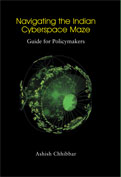
- Publisher: KW Publishers
2020
Cyberspace has turned out to be one of the greatest discoveries of mankind. Today, we have more than four and a half billion people connected to the internet and this number is all set to increase dramatically as the next generational Internet of Things (IoT) devices and 5G technology gets fully rolled out.India has been at the forefront of this amazing digital revolution and is a major stakeholder in the global cyberspace eco system. As the world embarks on embracing internet 2.0 characterised by 5G high speed wireless interconnect, generation of vast quantities of data and domination of transformational technologies of Artificial Intelligence (AI), blockchain and Big Data, India has been presented with a unique opportunity to leapfrog from a developing country to a developed knowledge based nation in a matter of years and not decades.
This book presents an exciting and fascinating journey into the world of cyberspace with focus on the impactful technologies of AI, block chain and Big Data analysis coupled with an appraisal of the India cyberspace eco system. It has been written especially for a policy maker in order to provide a helicopter overview of the cyberspace domain in adequate detail in simple and understandable language.
- ISBN: 978-93-89137-47-7 ,
- Price: ₹.1280/-
- Publisher: KW Publishers
-
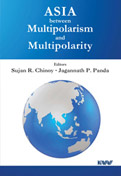
- Publisher: KW Publishers
2020
This book aims to map the Asian power trajectory and the continent’s contemporary journey towards greater multipolarity. This volume examines the impact of plurilateral and multilateral dialogues and cooperative mechanisms on Asia’s security and economic architecture. It is based on the proceedings of the thought-provoking 20th edition of the Asian Security Conference which was held from March 26-28, 2019 at the Manohar Parrikar Institute for Defence Studies and Analyses, New Delhi.- ISBN: 9789389137439 ,
- Price: ₹.1280/-
- Publisher: KW Publishers
-

- Publisher: KW Publishers
2020
Combat aircraft, a powerful component of military strength, define the battle space today. In the last five decades, world combat aircraft inventory, after peaking in 1988, gradually declined owing to changes in the geopolitical landscape, altering character of war, evolving technology and emerging alternatives. Today, there are 106 countries in the world that own and operate around 80 types of approximately 18,000 combat aircraft. But, there are only 19 countries that have more than 200 combat aircraft in their inventories. In this book, the available data of the world’s combat aircraft inventory is analysed for the trends and probable reasons for changes in the holdings, before predicting the future trajectory of manned combat aircraft. Additionally, the role of combat aircraft and their interplay with various tenets of Indian air power capability and the likely future is discussed.- ISBN: 9789389137446 ,
- Price: ₹.1280/-
- Publisher: KW Publishers
-
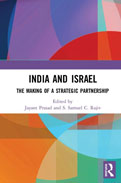
- Publisher: Routledge
2020
India and Israel contextualises the varied aspects of the partnership between India and Israel, with a specific focus on the dominant driver — the defence engagement between the two sides, forged in the context of mutual complementarities.India’s broad-spectrum relationship with Israel transformed into a strategic partnership in 2017, a quarter century after the establishment of full diplomatic ties. India and Israel have successfully steered the relationship forward, despite the baggage of fraught and convulsive neighbourhoods. The contributors to this volume include policy makers and military leaders who played an important role in the growth of the relationship, as well as academics who have closely followed its growth, shedding important light on the transformation of the India-Israel bilateral relationship into a strategic partnership over the course of past tumultuous 25 years. Chapters highlight Israel’s increasing engagement with India’s diverse federal polity, the de-hyphenation of the India-Israel ties from India’s relationship with Palestine, as well as the role played by US non-state (pro-Israel US-based interest groups) and sub-state (US Congressmen) actors in shaping India-Israel ties. The concluding chapter examines Israel’s relationship with the Peoples Republic of China (PRC), given that both the PRC and India established diplomatic ties with Israel almost simultaneously.
India and Israel will be of great interest to scholars of strategic studies, international relations, Middle Eastern Studies, Asian Studies, as well as those working in diplomacy, government and the military. The chapters were originally published as a special issue of Strategic Analysis.
- ISBN: 9780367465049,
- Price: £96.00
- Publisher: Routledge
-
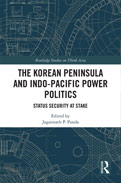
- Publisher: Routledge
2019
This book assesses the strategic linkages that the Korean Peninsula shares with the Indo-Pacific and provides a succinct picture of issues which will shape the trajectory of the Korean Peninsula in the future.This book analyses how critical actors such as the United States, China, Russia and Japan are caught in a tightly balanced power struggle affecting the Korean Peninsula. It shows how these countries are exerting control over the Korean Peninsula while also holding on to their status as critical actors in the broader Indo-Pacific. The prospects of peace, stability and unity in the Korean Peninsula and the impact of this on Indo-Pacific power politics are explored as well as the contending and competing interests in the region. Chapters present country-specific positions and approaches as case studies and review the impact of power politics on stakeholders’ relationships in the Indo-Pacific. The book also argues that the Korean Peninsula and the issue of denuclearization is of primary importance to any direction an Indo-Pacific Partnership may take.
Bringing together scholars, journalists and ex-diplomats, this book will be of interest to academics working in the field of international relations, foreign policy, security studies and Asian studies as well as audiences interested
- ISBN: ISBN: 978-0-367-36423-6 (hbk)
ISBN: 978-0-429-34585-2 (ebk), - Price: £120.00
- Publisher: Routledge
-
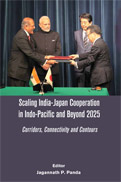
- Publisher: KW Publishers
2019
This book aims to examine the scope and potential of India-Japan cooperation factoring infrastructure connectivity and corridors in Indo-Pacific. The volume examines the bilateral, trilateral and multilateral contours of the growing partnership in the backdrop of a rising China that is rapidly changing the geo-political order of the region. The volume examines the scope of India-Japan relations beyond 2025 and evaluates how their common pledge to have a “partnership for prosperity” is not free from challenges. China’s Belt and Road Initiative, the United States bilateral-oriented approach towards Asia, and the struggle to successfully conclude the Regional Comprehensive Economic Partnership (RCEP) is testing the character of India-Japan relations which the volume covers at length.- ISBN: 978-93-89137-29-3 ,
- Price: ₹.1280/-
- Publisher: KW Publishers
